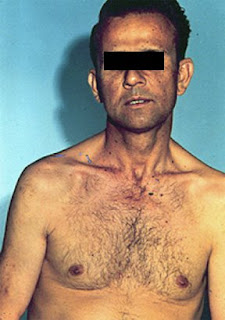

there is generalized pegmentation,most marked in scars,skin crease and buccal mucosa.
examin the abdomen for adrenal scar(Nelson syndrome)
check the BP lying and standing
how would you confirm the diagnosis?
Random cortisol
Short synacthin test (normal cortisol rise above 600 nmol/l or increase by 300 nmol/l)
ACTH level or long synacthin test
what is the most common cause?
mention other caues of hyperpegmentaion.
what is Schmidt's syndrome?

causes of Addison's disease:
ReplyDelete1-80% idiopathic(autoimmune)
2-TB
3-metastasis
4-HIV infection
Short synacthin test:
ReplyDeleteAdrenal glucocorticoid secretion is controlled by ACTH released by the anterior pituitary.
This test evaluates the ability of the adrenal cortex to produce cortisol after stimulation by synthetic ACTH (tetracosactide; Synacthen ®).
Adrenal insufficiency is excluded by an incremental rise in cortisol of > 200nmol/L and a 30 min value > 600 nmol/L.
Autoimmune
ReplyDeleteSchidmt syndrome- Addison disease together with hypothyroidism
Nice blog right here! Also your web site rather a
ReplyDeletelot up very fast! What web host are you the usage of?
Can I am getting your affiliate hyperlink for your host? I
wish my web site loaded up as quickly as yours lol
My web-site
Thank you a lot for sharing this with all of us you really realize what you're speaking about! Bookmarked. Please also visit my site =). We may have a link exchange agreement among us!
ReplyDeleteAlso visit my page;
Hmm it seems like your website ate my first comment (it was super long) so I guess I'll just sum it up what I wrote and say, I'm thoroughly enjoying your blog.
ReplyDeleteI as well am an aspiring blog writer but I'm still new to the whole thing. Do you have any tips for newbie blog writers? I'd really appreciate
it.
my webpage -
Schidmt syndrome- Addison disease together with hypothyroidism and DM1
ReplyDeletelongchamp handbags
ReplyDeletebalenciaga shoes
balenciaga shoes
jordan shoes
supreme t shirt
yeezy boost
adidas ultra boost
converse outlet
nike air vapormax
air max